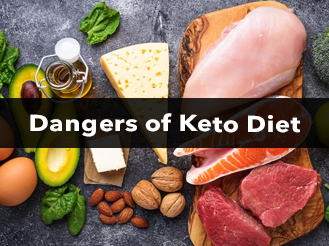Dangers of Keto Diet: A keto diet is famous for being a low carb diet to initiate weight loss, where the body produces ketones in the liver to be used as energy. By lowering the intake of carbs, and increasing the intake of fats, our body is induced into a state of ketosis. Ketosis is a natural process the body initiates to aid us to survive when the food intake is low. Although the end goal of a keto diet is to lose weight by forcing the body into a metabolic state, this can have adverse short term and long terms side effects on the body.
- Keto Flu
One of the most common side effects of Keto diet is the keto flu. Sudden carbohydrate withdrawal leads to people reporting mood swings, irritation, fatigue, dizziness and nausea. Keto flu is one of the main reasons for stopping progress on a ketogenic diet as the body takes time to adapt to use fat to fuel.
- Heart Diseases and Keto Diabetes
Another major health risk associated with following a ketogenic diet is increased risk of heart diseases and keto diet diabetes. Also known as a cardiologist’s nightmare, ketogenic diet adds to increased cholesterol due to high intake of fatty foods. In certain cases, it may raise the risk of dying from cancer and may also result in heart attacks among other cardiovascular diseases.
- Loss of Muscle Tissues
The longer you are on a ketogenic diet, the more fat you burn as this diet for weight loss may lead to loss of muscle tissue. While protein is considered as the powerhouse muscle builder, carbohydrates are vital in maintaining and forming muscles. In the process of losing muscles, there are high possibilities of the heart getting damaged as well.
- Nutritional Deficiencies
Another danger of following a keto diet is that may introduce nutritional deficiencies due to not being able to consume adequate minerals, vitamins and nutrients. Renowned nutritionists around the globe do no recommend this as a long-term diet as it is not a balanced diet. Keto diet also eliminates the consumption of essential food groups such as legumes, beans, whole grains, certain fruits, and vegetables.
- Athletic Underperformance
Although athletes claim that following a keto diet has led to improved performances due to rapid weight loss, dieticians do not agree with this. Studies have shown that the human body is in a more acidic state when it’s in ketosis, which may limit its ability to perform at peak levels.
- Loss of Electrolyte
When you switch to a keto diet, and radically reduce the intake of carbs and processed foods, the body’s sodium and electrolyte levels also decrease. Due to this, you are likely to face symptoms as racing heartbeat, palpitations, dizziness, constipation, and bloating.
- Instant Weight Gain
Dangers of Keto Diet: Apart from this, one of the main problems people face after they discontinue their ketogenic diet is instant weight gain. Keto diet is very restrictive and therefore becomes an inappropriate diet to follow in the long term. Once the person goes back to devouring carbs, they are very likely to reverse the effect of keto diet by putting on excess weight. This diet mainly appeals to people who have unhealthy relationships with food thus leading to issues relating to portion control and binge eating.
In conclusion, every coin has two sides, keto will help to reduce weight, boost energy, prevent certain diseases only if it is performed in the appropriate manner. Going to extreme lengths and radically changing your diet may not be suitable for your body.






